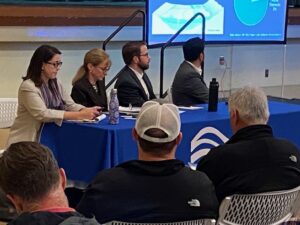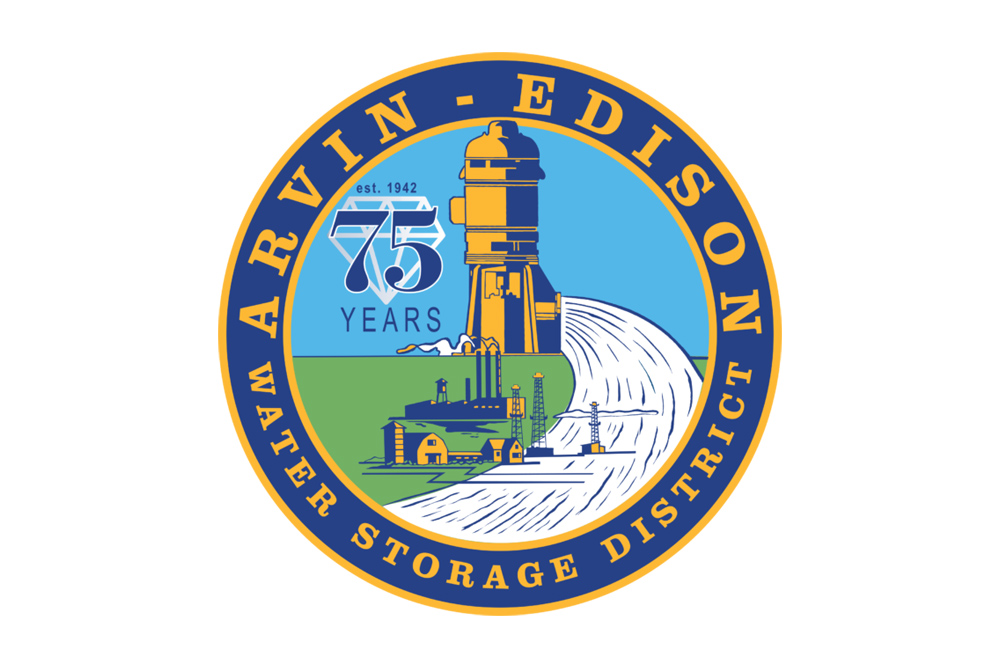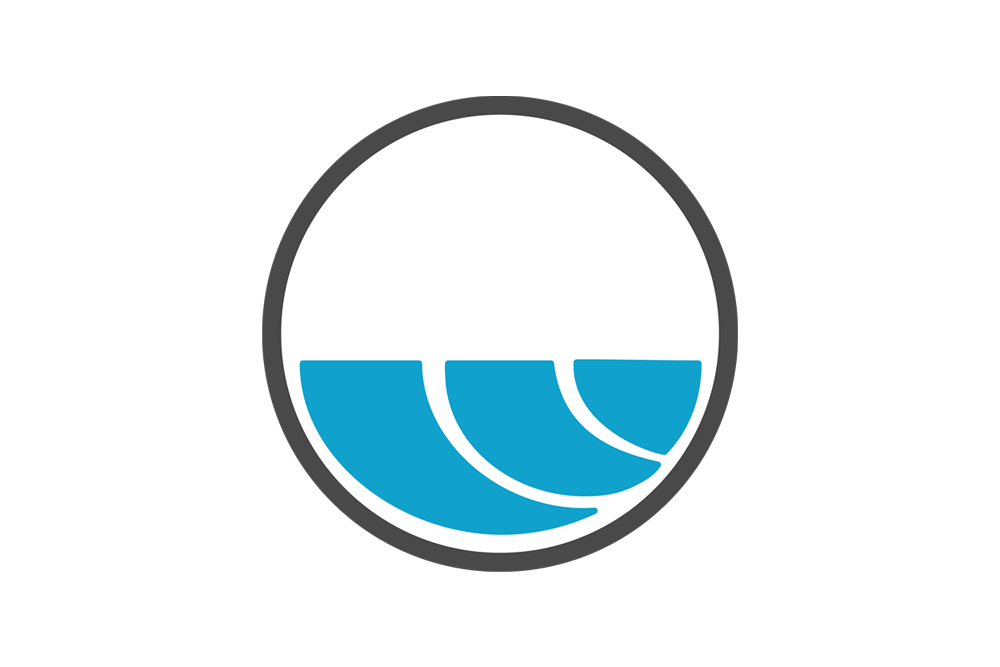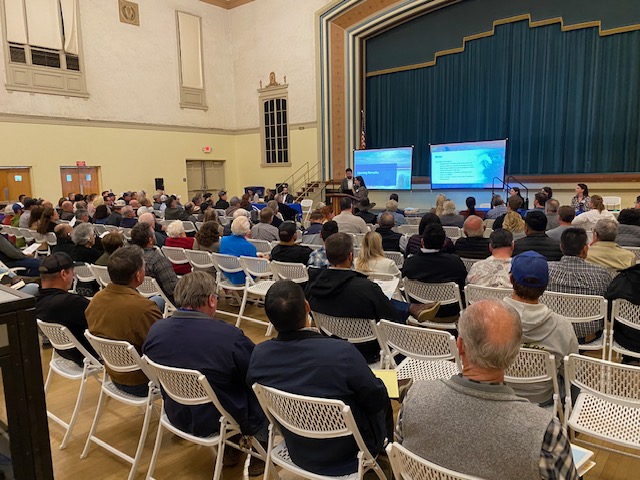About 300, motivated people showed up Wednesday evening November 8th at the beautiful and historic Hanford Civic Center to hear the State Water Resources Control Board staff talk about putting the Tulare Lake Subbasin into probation by April 2024. This will cost the area an immediate $30 million fine when it happens – if it happens. This is all part of how the Sustainable Groundwater Management Act is playing out in the San Joaquin Valley. On October 12th staff sent out a 176 page notice of the workshop scheduled on this topic. Folks showed up, listened and then responded.
How We Got There
But how did we get to a place where an unelected state agency has the power to come into an area and remove $30 million from an ag based economy? It started decades ago when surface water supplies to the San Joaquin Valley were repeatedly reduced in the name of environmental causes in the Delta. Despite numerous stressors in the Delta, like 90 percent of out-migrating juvenile salmon being eaten by nonnative stiped bass and the City of Sacramento discharging not fully treated sewage into the Delta – the culprit was targeted as water exports to the San Joaquin Valley.
surface water supplies to the San Joaquin Valley were repeatedly reduced in the name of environmental causes in the Delta. Despite numerous stressors in the Delta, like 90 percent of out-migrating juvenile salmon being eaten by nonnative stiped bass and the City of Sacramento discharging not fully treated sewage into the Delta – the culprit was targeted as water exports to the San Joaquin Valley.
Farming in the San Joaquin Valley was initiated as conjunctive use. That meant snow and rain captured in the reservoirs would be used to flood irrigate farmland, not only watering the crops but percolating into the aquifer and later used as groundwater. Surface water would become groundwater and then be reused after being pumped.
As water supplies tightened farmers opted to plant less acres of the much more flexible seasonal crops and more acres of expensive permanent crops such as fruit and nut orchards. To further stretch their surface water supply they deployed the far more effective micro irrigation. However, although micro irrigation conserves water – and some estimates show more than 90 percent of the Valley uses micro irrigation – it doesn’t recharge aquifers.
Eventually with the reduced supply of surface water growers had to become more dependent on pumping groundwater to keep their permanent crops alive. More water is pumped from the aquifer than is being replenished. By the 2010s something had to be done to prevent many parts of the Valley’s aquifer from collapsing upon itself and other problems from over pumping.
SGMA
In 2014 two pieces of legislation were passed; SGMA – the Sustainable Groundwater Management Act and the Proposition One water ballot initiative. Prop One dedicated $2.7 billion to increased surface water storage. Now, nine years later not a single new reservoir has been built and no new surface water supplies have been made available to the San Joaquin Valley. And that’s about all there is to say about Prop One. SGMA however has rolled on.
Advocates for SGMA say California was one of the last developed places in the first world that didn’t regulate its groundwater. Denmark is a country almost wholly dependent on its groundwater. Denmark studied the problem for a decade and then wrote laws and regulations. Arizona studied the problem for five years and then wrote laws and regulations.
Two urban California legislators wrote SGMA and gave farmers three years to create an entirely new bureaucracy known as Groundwater Sustainability Agencies (GSA) geographically based within hydrological subbasins. Then in 2017 after all of the required GSAs were established within the deadline, they had three more years to figure out a Groundwater Sustainability Plan (GSP) to bring their area into groundwater balance by 2040. No one had ever written a GSP before but all of the subbasins were able to submit their plans by the 2020 deadline at the cost of tens of millions of dollars. But the carrot to go with SGMA’s stick was the promise of local control.
2040. No one had ever written a GSP before but all of the subbasins were able to submit their plans by the 2020 deadline at the cost of tens of millions of dollars. But the carrot to go with SGMA’s stick was the promise of local control.
GSPs
SGMA doesn’t state how to write a GSP as much as it states how not to. GSPs are meant to be plans to avoid six undesirable results.
- Chronic lowering of groundwater levels indicating a significant and unreasonable depletion of supply
- Significant and unreasonable reduction of groundwater storage
- Significant and unreasonable seawater intrusion
- Significant and unreasonable degradation of water quality
- Significant and unreasonable land subsidence
- Groundwater-related surface water depletions that have significant and unreasonable adverse impacts on beneficial uses of surface water.
Once the plans were complete, they were reviewed by the Department of Water Resources and comments were returned to the GSAs. The GSAs had to address each comment in a rewrite of the GSP. Upon further review if the rewritten GSPs were deemed inadequate they are referred to the State Board to determine if the subbasin should be placed in probation.
The Workshop
State Board staff conducted an online workshop Friday, November 3rd. The Hanford workshop was in person only. Four of the five State Board members, Laurel Firestone, Doreen D’Adamo, Sean McGuire and Chairman Joaquin Esquivel were in attendance.
After Esquivel’s opening remarks staff members Caroline Hackett, Sarah Sugar, Natalie Stork and attorney Amanda Pierson gave presentations covering an overview of state intervention under SGMA, the issues they had with the GSP and proposals they recommend the State Board adopt requiring certain actions by those pumping water in the Tulare Lake Subbasin.
Staff recommend at the scheduled April 16, 2024 hearing the State Board place the Tulare Lake Subbasin on probation. I’ve been told by sources who listened in on the previous Zoom meeting non-governmental organizations such as Visalia’s Community Water Center called for probation. Staff recommends all wells pumping more than 500 acre feet per year be required to install meters and the groundwater extraction reporting schedule be moved back from February to December.
Staff explained they found probation necessary because the GSP didn’t provide enough detail on how the GSA was going to mitigate harm to drinking water wells, slow and stop subsidence and prevent degradation of groundwater quality. They said the GSA hasn’t collected enough water quality data or set up adequate well mitigation funding.
The claim was made probationary fees are not meant to be punitive. However, if probation is adopted well owners will be charged $300 per well, $40 per acre foot pumped and late fees will be 25 percent per month. And meters cost on average about $4,000 each.
According to the Department of Water Resources’ latest annual SGMA report from 2022 the Tulare Lake Subbasin pumped 549,066 acre feet of groundwater. Although the exact number of wells pumping more than 500 acre feet per year isn’t known, a reasonable estimate of 2,300 wells was given by a local water professionals. This amounts to an additional cost to landowners in the Tulare Lake Subbasin of $690,000 for existing wells, $9.2 million for meters and $21,962,640 for water pumping fees. That totals $31,852,640 being removed from the local agricultural economy in 2024 should the subbasin go into probation.
It was added domestic wells are exempt from these fees and staff won’t recommend carving out any “good actor” locations for parts of the subbasin that are meeting expected SGMA goals.
Public Response
The meeting then opened the floor to questions and answers and comments. The first question was how will GSAs pay for well mitigation funding? It was pointed out 218 elections are costly to put on and often result in rejection. (Elections, known as 218 elections, are required before a local government agency can raise assessment fees.) Staff agreed 218 elections can be difficult but offered no alternative for funding the probation requirements.
It was asked how the $30 million will be spent. It will go to cover State Board costs for administering the probation. Staff said adjustments can be made depending on actual costs.
The 176 page letter from staff was rife with references to racial equity not being met by the GSP. Staff was asked where any mention of such considerations can be found in SGMA – because it’s not in the language of the law – how can it be used as criteria for judging GSPs? Staff said because the State Board has been authorized under SGMA to administer probationary actions and because the State Board has adopted a resolution to apply the lens of racial equity to its decision making process it has the ability to incorporate racial equity and public trust doctrine into its procedural guides.
GSPs? Staff said because the State Board has been authorized under SGMA to administer probationary actions and because the State Board has adopted a resolution to apply the lens of racial equity to its decision making process it has the ability to incorporate racial equity and public trust doctrine into its procedural guides.
From page 126 of the staff letter, “5.3.2 A Brief History of the Public Trust Doctrine
The public trust doctrine flows to the present from ancient Roman codes and English
Common Law judicial opinions about public rights to use water, air, wildlife, and
common spaces that are held in trust by the sovereign for the benefit of the public.”
The next sentence of the letter, “The sovereign here is the State of California and local jurisdictions implementing SGMA.”
Staff was asked if the people living in the Tulare Lake Subbasin are citizens or subjects because if they think the State Government of California is sovereign over the public then by extension the State Board must be sovereign over the public. Staff replied that wasn’t their intent when using that language. What else could they say? It was unfortunate the question even had to be asked.
Kings County Supervisor Doug VerBoon made a comment saying the entire westside of the San Joaquin Valley has benefitted greatly from the San Luis Reservoir. But the continual reduction in surface water by various government means has been extremely difficult on growers and therefore the local economy. He said the size of growers in the Tulare Lake Subbasin is all over the place. There are very large growers, some of the largest in the state, but many more smaller growers and you can’t just lump everyone into one category. He said we need a Self Help Enterprises for farmers.
Local grower and former GSA board member Steve Jackson said everyone realizes there’s subsidence and everyone is working diligently to address and fix the problem. But SGMA is supposed to allow 20-years to come into compliance. He said putting the subbasin into probation will harm farmers and hinder the goal of making the subbasin sustainable.
Johnny Gaily, a member of the Delta View Water Association told the board and staff placing Tulare Lake Subbasin first in possible probation is putting the subbasin at an unfair disadvantage. It is not allowing the SGMA process to play out as the law states, until 2040. He reminded staff the GSAs are all working very hard to come into compliance.
Dennis Mills is General Manager of the Kings County Water Agency. He said the GSAs are working very hard to resolve all issues before probation can be implemented. There are additional challenges unique to the Tulare Lake Subbasin and its three distinct aquifers. He said the GSA knows there are triggers; but what are the triggers? Staff didn’t have a response and Mills reminded them it is very difficult to hit a moving target that is supposed to stand still for 20-years.
Grower Jamie Bell told the board and staff he does feel like Sacramento is treating the people as subjects. He said there are anti-agriculture forces and that is not a conspiracy. He said it may be time for all farmers to tell the state government to go do something with itself that I’m not going to repeat here in case women or children read this. It’s also noteworthy that most speakers received applause from the audience, including Bell.
Engineer Kait Palys asked the staff to give a public review of its findings about the GSP on a transparent chapter by chapter basis. She said the GSAs could then formally adopt resolutions to modify its GSP without going into probation. Pretty smart actually.
Tulare Irrigation District General Manager and GM of the Mid Kaweah GSA Aaron Fukuda said it is a lack of surface water causing the problem. He asked why the good actor option was dismissed out of hand by staff. He asked if the criteria for a good actor is an approved GSP then how can there ever be any good actor. Good actor means one of the GSAs in a subbasin might be doing everything it can to become sustainable but the other GSAs are not. There is a provision in SGMA to allow the probation fees to be waived for good actors.
Local ag consultant Nathan Herringa told the board and staff he trusts the GSAs to get the job done and urged them to empower them to do so instead of hindering them.
Grower Joey Airoso reminded the board the San Joaquin Valley is the most prolific food producer on earth. He visited South Korea and was treated as someone who helps feed the people. Farmers are respected in most parts of the world. He said the state shares the blame for the overdraft of the San Joaquin Valley. He said we need more and improved infrastructure. He said if the Prop One funds were released in a timely manner and more storage created SGMA would be far less of a problem to solve. He urges the state to help and not harm.
Farmer and Punjabi American Growers Group representative Arshdeep Singh spoke saying the farmers’ pleas are falling on deaf ears. He said they know how to grow food but the state continues to cut back surface water hampering farmers. He said if anything the state should consider the sustainability of families in the Valley. They won’t be here much longer if something doesn’t change.
Rose Alexander from Assemblyman Devin Mathis’ office reminded the board and staff when it comes to racial equity the Valley is 80 percent Hispanic. The state needs to facilitate more pumping.
Lindmore Irrigation District and East Kaweah GSA General Manager Michael Hagman spoke saying the state board staff doesn’t realize what a big job it is going to get if it tries to take over running a subbasin. He said it’s like a dog chasing a car, what is it going to do when it catches it?
I made a comment. I ask questions at hearings all the time but to comment was like an actor breaking the fourth wall. But I felt compelled. I told the good folks from the state if SGMA isn’t mitigated up to one million acres of the best farmland on earth will be fallowed. It is estimated the Valley needs two million acre feet of its contracted water supplies restored to prevent this. We haven’t upgraded or expanded our major water infrastructure since the 1960s when 16 million people lived in California, now there is 40 million using the same plumbing. If just the fish screens at the Delta pumps were replaced with modern subsurface collections from under the water column we could capture a good part of the two million acre feet without any harm to the ecosystem. There is on average, 10 million acre feet above and beyond any environmental or regulatory need flowing out to sea each year. Often much more. If our surface supplies were restored there wouldn’t be any need for probation.
restored to prevent this. We haven’t upgraded or expanded our major water infrastructure since the 1960s when 16 million people lived in California, now there is 40 million using the same plumbing. If just the fish screens at the Delta pumps were replaced with modern subsurface collections from under the water column we could capture a good part of the two million acre feet without any harm to the ecosystem. There is on average, 10 million acre feet above and beyond any environmental or regulatory need flowing out to sea each year. Often much more. If our surface supplies were restored there wouldn’t be any need for probation.
Your Chance to Respond
After the meeting Esquivel and other members of the Board and staff made themselves available to talk. The Board members emphasized they have not made up their mind to accept staff recommendations and invoke probation. They want to hear from others before that decision is made. The Tulare Lake Subbasin is one of six subbasins, all in the San Joaquin Valley, under consideration of being placed on probation.
If you would like to comment on the State Board staff’s recommendation to place the Tulare Lake Subbasin in probation the deadline is noon December 11, 2023. You can submit comments at: SGMA-TulareLake@waterboards.ca.gov. If the file is greater than 15 megabytes in size, the written comments may be submitted by fax at (916) 341-5620, in multiple emails, by mail, or hand delivery.
Mail/Hand Delivery: Comments submitted by mail or hand delivery must be addressed as follows: Courtney Tyler, Clerk to the Board, State Water Resources Control Board
1001 I Street, 24th Floor, Sacramento, CA 95814-0100 (hand delivery)
P.O. Box 100, Sacramento, CA 95812-2000 (mail)
Mail must be received (not postmarked) at the State Water Board office by December 11, 2023. All hand-delivered submittals must arrive and be date and timestamped prior to December 11, 2023, at 12:00 noon. Couriers delivering hard copies of comment letters must check-in with lobby security personnel who will contact the Clerk to the Board at (916) 341-5611.
DISCLAIMER OF RESPONSIBILITY; Waterwrights.net strives to provide its clients with the most complete, up-to-date, and accurate information available. Nevertheless, Waterwrights.net does not serve as a guarantor of the accuracy or completeness of the information provided, and specifically disclaims any and all responsibility for information that is not accurate, up-to-date, or complete. Waterwrights.net’s clients therefore rely on the accuracy, completeness and timeliness of information from Waterwrights.net entirely at their own risk. The opinions expressed in this report are those of the author and do not represent any advertisers or third parties.
ALL RIGHTS RESERVED. Copyright 2023 by WaterWrights.net

































